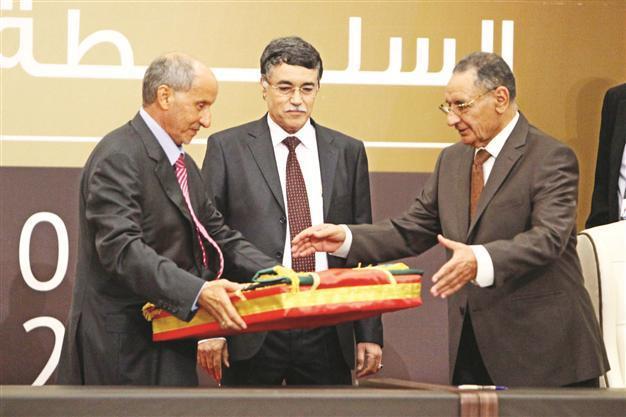Libya’s newly elected assembly gets power
TRIPOLI

Libya’s National Transitional Council Chairman Abdul Jalil (L) symbolically passes the reins to Salim (R), the oldest member of the new 200-member assembly. EPA photo
Libya’s ruling council handed over power to a newly elected national assembly in the country’s first peaceful transition of power in its modern history following the overthrow of Moammar Gadhafi.“I hand over the constitutional prerogatives to the General National Congress, which from now on is the legitimate representative of the Libyan people,” Mustafa Abdul Jalil, leader of the National Transitional Council (NTC) said Aug. 8.
Jalil symbolically passed on the reins to Mohammed Ali Salim, the oldest member of the new 200-member assembly that was elected on July 7. The congress, whose members took an oath led by Salim, was set to name a new chairman yesterday while the NTC will be disbanded.
The assembly will name a new prime minister who will pick his government, pass laws and steer Libya to full parliamentary elections after a new constitution is drafted next year. Large crowds gathered in Tripoli’s Martyrs Square to celebrate the handover as fireworks lit up the sky.
‘Historic moment’
Jalil welcomed what he said was “the first handover of power in Libya’s history” as a “historic moment” for all Libyans. But he admitted that “mistakes” had been made during an “extraordinary” transition period and that security and disarmament issues had not been resolved in time. He said the NTC had also failed to find a solution to the refugee crisis, according to Agence France-Presse, which he said was a “real tragedy.”
Security priority
A liberal coalition led by wartime rebel Prime Minister Mahmoud Jibril won 39 of the 80 party seats in the congress, while its Islamist rivals, the Justice and Construction Party (JCP), the political wing of the Muslim Brotherhood, won 17. However, the remaining 120 seats are in the hands of independent candidates whose allegiances are hard to pin down.
In the battle to hold sway over the assembly, where key decisions will require a two-thirds majority, Jibril’s National Forces Alliance and the JCP are scrambling to form alliances with independents and smaller parties. Some independents, distrustful of both sides, have spoken of forming their own coalition.
Getting a grip on security in an often anarchic post-Gaddafi Libya will be the priority for the country’s new rulers, Deputy Prime Minister Mustafa Abu Shagour told Reuter. The run-up to the transition has been overshadowed by several violent incidents in the past week that have shown the country’s precarious stability.
















